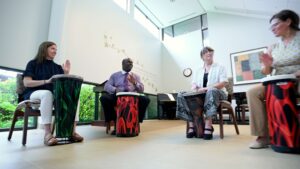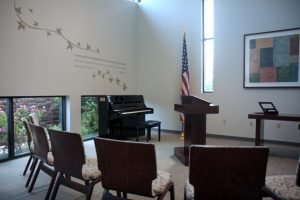Spiritual Care at Lindner Center of Hope
Spiritual Care at Lindner Center of Hope
WE SEE THE INNATE WORTH OF ALL PEOPLE
Spiritual Care has been an important part of care at Lindner Center of Hope from its beginning. The team of trained interfaith clinical chaplains and volunteers aims to accompany patients, their families & our staff on their spiritual & HOPE JOURNIES, and to help others discover their PURPOSE, find MEANING, & seek CONNECTION.
We will accomplish our purpose by:
- Listening more than we speak.
- Being curious about others.
- Seeking to understand without judgement.
- Setting aside preconceptions.
- Presenting our authentic selves.
- Offering transparency within limits.
- Using humor – when helpful.
- Encouraging exploration of self.
Benefits of Spirituality & Religion – Research findings
- Greater emotional and physical well-being with higher motivation to do well in treatment
- Reduced extent of psychopathology, decrease in addictive & depression symptoms & readmissions over time.
- More well-defined coping and survival skills and strengthening of social support
Spiritual Care Staff Offer:
- Individual Spiritual Care
- Prayers and rituals
- Pastoring within our own faith tradition
- Enrichment Groups on the units
- Catholic Communion weekly
- Support for all Faith Traditions
- Advocate for spiritual needs and practices within treatment
- Sunday Spiritual Gathering
- HealthRhythms® Group Empowerment Drumming
- Grief and Loss support and resources
- Labyrinth
- Support during Electroconvulsive therapy (ECT)
Team Leader:
Valerie LK Martin, MDiv, CGP, Spiritual Care Coordinator
The Faith Center
Uniquely designed to seat up to 32 people, the Faith Center offers a tranquil atmosphere to enhance the essential spiritual care we provide for our patients and their families. The Faith Center includes a piano and a meditation garden.
 HealthRHYTHMS® Group Empowerment Drumming
HealthRHYTHMS® Group Empowerment Drumming
HealthRHYTHMS® is a fun, evidence-based whole person strategy which promotes socialization and ensures a healthy non-strenuous workout. On a deeper level it builds bridges while fostering nurturing, support, camaraderie, self-respect and respect for others. It is not really about drumming but uses the drum as a tool for communication and personal expression.
 “Spirituality is the aspect of humanity that refers to the way individuals seek and express meaning and purpose, and the way they experience their connectedness to the moment, to self, to others, to nature, and to the significant or sacred.”
“Spirituality is the aspect of humanity that refers to the way individuals seek and express meaning and purpose, and the way they experience their connectedness to the moment, to self, to others, to nature, and to the significant or sacred.”
– Dr. Christina Puchalski, Director of the George Washington University Institute for Spirituality and Health.
Articles